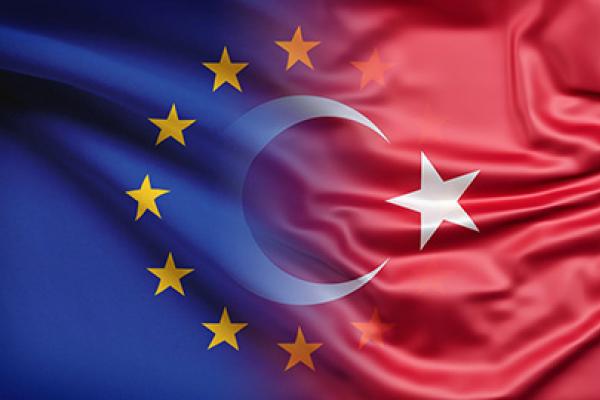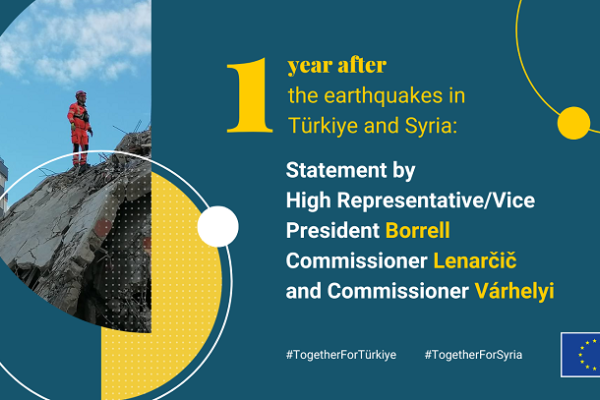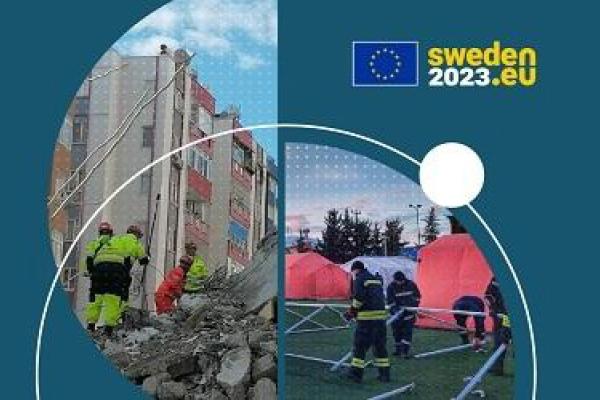Membership status
Candidate country
EU – Türkiye Relations
Türkiye is a key strategic partner of the EU on issues such as climate, migration, security, counter-terrorism and the economy.
In 1987, Türkiye applied to join what was then the European Economic Community, and in 1999 it was declared eligible to join the EU.
Türkiye's involvement with European integration dates back to 1959 and includes the Ankara Association Agreement (1963) for the progressive establishment of a Customs Union (ultimately set up in 1995).
Accession negotiations started in 2005, but until Türkiye agrees to apply the Additional Protocol of the Ankara Association Agreement to Cyprus, eight negotiation chapters will not be opened and no chapter will be provisionally closed.
In 2018, due to continuing backsliding in reforms in the key areas of the enlargement strategy, in particular in the functioning of the democratic system, respect for fundamental rights and independence of the judiciary, the Council decided that accession negotiations were at a standstill.
A visa liberalisation dialogue was launched in 2013. For the fulfilment of the requirements of its visa liberalisation roadmap several outstanding benchmarks remain. Türkiye’s economy is facing several challenges, such as high unemployment, depreciation of its currency and record-high inflation. Strong economic volatility has undermined the business environment and overreliance on external financing has created vulnerabilities.
Türkiye has seen an unprecedented influx of people seeking refuge from Syria which to date stands at 3.3 million (out of a total of 4 million of refugees in the country). Furthermore, the increasing political instability across its eastern border has brought around 300 000 asylum-seekers and refugees from other countries including Iraq, Afghanistan, Iran and Somalia to Türkiye. Overall, Türkiye is hosting the largest refugee populations worldwide and has already spent significant financial resources on addressing this crisis. The EU and Türkiye confirmed their shared commitment to end irregular migration from Türkiye to the EU, to break the business model of smugglers and offer migrants an alternative to putting their lives at risk in their joint statement of 18 March 2016.
The establishment of the EU Facility for Refugees in Turkey was the answer to the EU Member States’ call for significant funding to support refugees in the country, and coordinates the mobilisation of EUR 6 billion, in two tranches. The Facility’s priority areas are education, health, protection, basic needs, socio-economic support and municipal infrastructure. The full operational budget of the Facility was committed in November 2019.
In 2020, continuity of support was ensured through additional humanitarian funding amounting to €535 million, which extended two flagship programmes launched under the Facility.
Further to the European Council conclusions of June 2021 the EU allocated €3 billion to refugees in Türkiye for 2021-2023. This additional funding should ensure the continuation of key Facility interventions in the priority areas of health, education, basic needs and livelihoods, as well as migration management.
Türkiye is eligible for EU financial support through the Instrument for Pre-accession Assistance (IPA III 2021-2027) and also from the European Fund for Sustainable Development Plus (EFSD+). To support public and private investments in the priority areas of the EFSD+ (Green Deal, Global Gateways and Decent Jobs), the Turkey Investment Platform was established in 2022.
Negotiation chapters
| Open |
|
Free Movement of Capital |
| Provisionally closed |
| Science & Research |
The EU Delegation in Ankara provides more information on Türkiye.
Factsheets and Factographs available to download:
- EU factograph on the status of implementation in Türkiye
Türkiye 2023 Enlargement Package Factsheet - Factsheet: EU support to the people in Türkiye and Syria following the earthquakes - EN | TR
- Factsheet - Responding to the Syrian Crisis: EU Support to Türkiye - EN | TR
Timeline
- November 2022The first EU-Türkiye High level dialogue on science, research, technology and innovation takes place in Brussels.
- May 2022The EU-Turkey political directors meeting takes place in Ankara.
- May 2022The EU-Turkey high- level dialogue on agriculture takes place in Ankara.
- April 2022The second EU-Turkey high- level dialogue on climate takes place in Ankara, following the first meeting of the dialogue in September 2021 in Brussels.
- March 2022The 80th EU-Turkey Joint Parliamentary Committee takes place in Brussels.
- November 2021The EU-Turkey high-level dialogue on health takes place.
- October 2021The EU–Turkey high-level dialogue on migration and security takes place in Ankara.
- April 2021The Presidents of the European Council and of the European Commission meet the President of Türkiye in Ankara.
- March 2021The European Council expresses the EU's readiness to engage with Türkiye in a phased, proportionate and reversible manner to enhance cooperation in a
(Launch of ‘positive agenda’)
- March 2020EU-Turkey Leaders' meeting takes place in Brussels.
- November 2019The EU adopts a framework for targeted measures against Türkiye for its illegal drilling activities in the Eastern Mediterranean.
- March 201954th EU-Turkey Association Council held.
- June 2016Accession conference with Türkiye: Talks opened on Chapter 33 - Financial and budgetary provisions.
- April 2016First Implementation Report of Statement.
- March 2016EU-Turkey Statement.
- December 2015Negotiations are opened on chapter 17 - Economic and monetary policy.
- November 2015First EU-Turkey Summit held and Joint EU-Turkey Action Plan activated.
- December 2013Visa liberalisation dialogue launched and EU-Turkey Readmission Agreement signed.
- November 2013Negotiations are opened on chapter 22 – Reg. Policy and Coordination of Structural Instruments.
- May 2012Positive Agenda intended to bring fresh dynamics into the EU-Türkiye relations was launched.
- June 2010Negotiations are opened on Chapter 12 (food safety, veterinary and phytosanitary policy).
- February 2008Council adopts revised Accession Partnership for Türkiye.
- December 2006Because Türkiye refused to apply to Cyprus the Additional Protocol to the Ankara Agreement, Council decides that eight chapters will not be opened.
- June 2006Negotiations are opened and closed on Chapter 25 (science and research).
- October 2005Council adopts negotiating framework, and negotiations are formally opened.
- October 2005"Screening process" begins to determine to what degree Türkiye meets the membership criteria and what remains to be done.
- December 2004European Council declares that Türkiye sufficiently fulfils the criteria for opening accession negotiations in October 2005.
- May 2003Council adopts revised Accession Partnership for Türkiye.
- March 2001Council adopts Accession Partnership for Türkiye.
- December 1999Helsinki European Council declares Türkiye a Candidate Country.
- December 1997Luxembourg Council summit declares Türkiye eligible to become EU member.
- December 1995Türkiye-EU Association Council finalises agreement creating a customs union.





